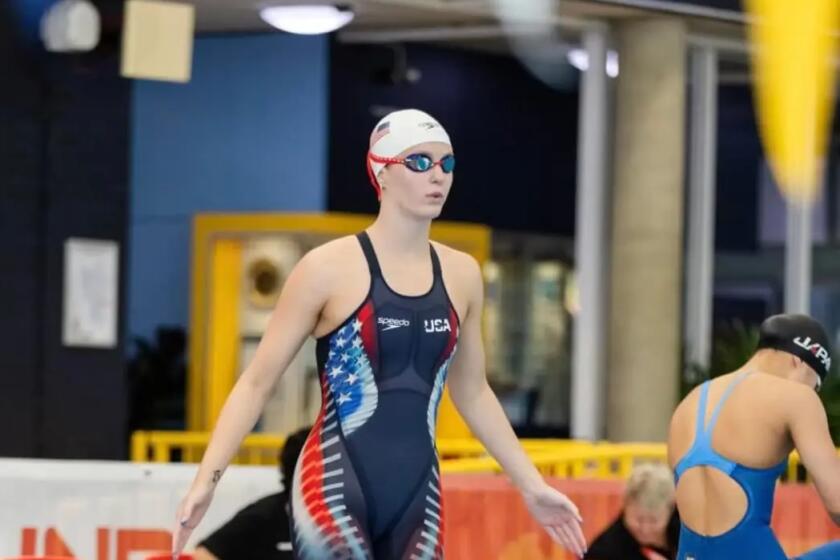THE BRAIN GAME : Colleen Walker Tries to Tap Her Potential, Maybe Even Win a Tournament
- Share via
These days, Colleen Walker is thinking about the right side of her brain. This is a (gray?) matter of extreme importance to Walker, the year’s wealthiest non-winner on the women’s golf tour. She has been so close to victory that she can almost, well, see it in her mind.
In just the last two weeks, she was second in the Nabisco Dinah Shore and second at San Diego. Walker also tied for fourth at Phoenix the week before the Dinah Shore tournament, which means that with any kind of luck she might already have been a three-time winner.
At least, second place has been financially rewarding to Walker, a 31-year-old former Florida State golfer. She has won $62,812 in the last two weeks and $105,498 this year, which puts her third on the money list, behind Ayako Okamoto, who beat her last week, and Amy Alcott, who beat her the week before.
Such is golf, said Walker, who has decided to use brain power to tap her potential and maybe even win a tournament. First place is not the only place to look for a successful golfer, Walker says.
“That’s everybody else’s expectations, I know,” she said. “I don’t have expectations. I have goals. My goals are to win tournaments. Collect titles. But you’ve got to be patient. You get frustrated. It’s too easy to get frustrated.”
Much easier than, say, winning a tournament. Maybe it will begin to happen for Walker today when she tees off in the $400,000 AI Star Centinela Hospital tournament at Rancho Park. Because it is only a 54-hole tournament, there is less time for things to go wrong.
Walker is working on “seeing” every shot in her mind. She imagines the shot, imagines where it is going to land and then watches it land before she even moves. The idea is to picture the swing and the placement of the ball on the fairway or green. To accomplish this, Walker said, she has been trying to use the right side of her brain.
The cerebrum, the largest portion of the brain, is divided into two hemispheres. Some experts maintain that the right side produces creative responses, the left side more analytical responses.
“This kind of intrigues me,” Walker said.
For instance?
“I hit a shot last week to the left of the green on a par-3,” she said. “In my mind, I knew exactly where it had to land. And I almost chipped it in.”
This is part, but not all, of what Walker has going for her. It helps to have some talent, too, and Walker apparently has plenty of that.
Her career earnings of $447,492 reflect a steady improvement in her game. Last year, Walker won $190,000 as well as a tournament and nearly tripled her 1986 winnings.
She finished in the top 10 six times in 1987 and is doing even better this year: eight tournaments and six top-10 finishes. That is the best ratio on the women’s tour. Walker has also played more rounds under par, 16, than anyone else, and has recorded more birdies, 101, than anyone else. Her scoring average of 71.16 is third only to Okamoto’s 70.63 and Nancy Lopez’s 71.
Once Walker established herself on the LPGA tour, about the only thing she had trouble with was addition. Twice in four weeks in 1986, Walker failed math. She was disqualified for signing an incorrect score card in the Du Maurier tournament, which cost her $2,000, and again in the MasterCard International pro-am, which cost her $18,500. Walker turned herself in after she finished--where else?--second.
Walker has won once, though, since turning pro in 1982. She was first in last year’s Mayflower tournament, beating Sally Quinlan by a shot, and took home $52,500.
She also finished the year on a high personal note. Walker married Ron Bakich in December, but she kept her own name because she thought her husband’s was too tough for others to spell.
There is another man, too, in Walker’s life. Chuck Hogan of Naples, Fla., is the operator of Sports Enhancement Associates, and he is the person with access to the right side of Walker’s brain. She talks with Hogan by telephone about once a week.
“Basically, I want to explain what is going on and what has happened so we can go in each week with a new, fresh outlook,” Walker said. “It helps him understand me. Chuck has helped me to learn how to help myself. It’s been an interesting type thing. I’m a big thinker.”
Muffin Spencer-Devlin, possibly the leading big thinker on the women’s tour, thinks that thinking of this sort has been good for Walker.
“Colleen has come along slowly but surely,” Spencer-Devlin said. “I know finding the visualization technique really made a difference for her. She’s like me in that we both spent some time in the lower echelon. You appreciate it so much more when you make it.
“And ‘making it’ doesn’t necessarily mean winning the tournament every week. Making it means doing the best job you can every week. With Colleen, that’s where her good feelings come from. The strongest part of her game is now her mental game.”
Does that translate into a win for Walker? Maybe, maybe not, Spencer-Devlin said.
“When it’s her week, it’ll be her week,” she said.
Seems fair. Until that week comes, Walker is going to continue to use the right side of her brain in trying to play down the middle of the fairway. She said she will be patient and, sooner or later, will win. That means first place, not one of those seconds again.
“I think it’ll come,” Walker said. “Right now, I’ve played as well as I could. What else can I say? Some other people might have as many seconds and they might let it get to them so bad, they’re down in the dumps for a few weeks. Then you feel sorry for yourself, make excuses and become your own worst enemy.”
And when Walker finally wins that elusive tournament this year, what will she feel? Relief? Joy? Shock? Nothing? And what is she going to say?
“Oh, I know what I’ll say, all right,” Walker said. “I’ll say one word: Finally !”
More to Read
Go beyond the scoreboard
Get the latest on L.A.'s teams in the daily Sports Report newsletter.
You may occasionally receive promotional content from the Los Angeles Times.










